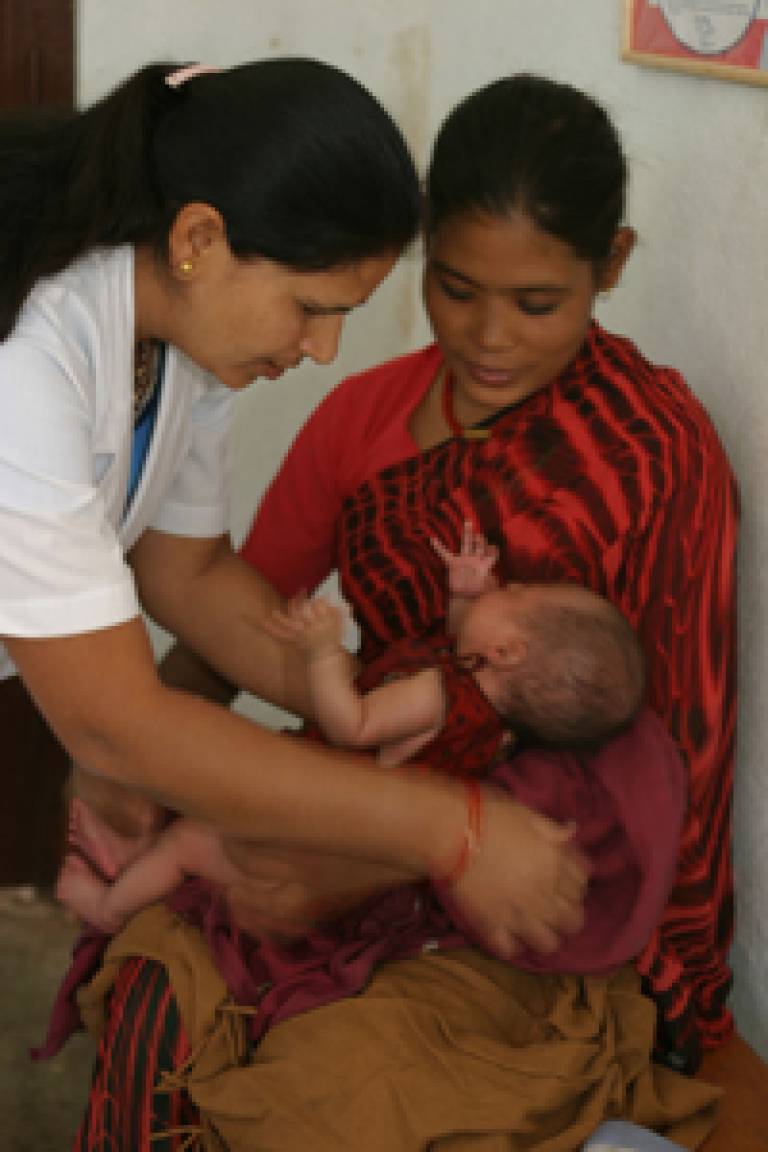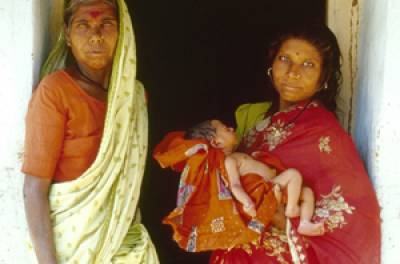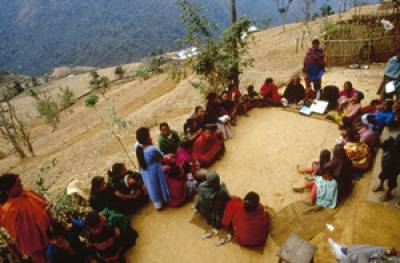Influencing government policy in Nepal
6 September 2006
Work by UCL researchers in Nepal has led to the government adopting a radical new policy of giving financial incentives for women to seek appropriate healthcare during childbirth.
 UCL News
follows the ongoing activities of the Institute for Child Health in the
remote Himalayan kingdom.
UCL News
follows the ongoing activities of the Institute for Child Health in the
remote Himalayan kingdom.
In a country where much of the population lives in mountainous regions, where a single path winding its way through difficult terrain is all that connects one small village from the next, it may not be surprising that events such as childbirth have traditionally taken place in the home. Today, Nepal has modern healthcare facilities, but 95 per cent of mothers and newborn babies do not have easy access to them. For many Nepalese parents, it takes several days to reach a healthcare centre, and it can be very expensive to travel and pay for medicines.
This may all be set to change, as a collaborative team from the UCL Institute of Child Health (ICH) and the London School of Hygiene & Tropical Medicine (LSHTM) are currently involved in evaluating a major government initiative to encourage mothers to give birth in hospitals or health centres.
The initiative works by paying women to travel to health centres at a level proportionate to how far they travel. So, for women who live in the most remote regions, 1500 rupees are given, falling to 1000Rs for people in the hills and 500Rs for people who live nearer to healthcare centres. The model is known as a conditional cash transfer (CCT) and reflects a realisation that there is a need to incentivise women in the area to break with tradition and seek healthcare at such an important time. It is a radical new way of working in the international development field, but appears to be having some success.
Policy development
The ICH/LSHTM team played a key role in developing the policy. In 2004, the partnership reported on the heavy burden of costs of maternity care to families, which led to the Nepali government introducing the CCT scheme.
Subsidised by the UK Department for International Development for five years, the programme is unique and could have a big impact on infant mortality in one of the world's poorest countries. However, it is far from easy to monitor and control. The evaluation that has recently begun seeks to measure how effectively the scheme is being implemented and how knowledge of the programme is being spread, and to measure its impact on women's and children's health. It is due to last for three years.

Professor Anthony Costello, who heads the International Perinatal Care Unit at ICH, has been travelling to Nepal at least three times a year since 1990 because of his involvement in research projects. He said: "We work closely with MIRA (Mother and Infant Research Activity), a local organisation led by Professor Dharma Manandhar. Today it is staffed entirely by about 600 Nepalese, including several former UCL Masters students from Nepal.
The ICH currently has three research fellows in Nepal
permanently. Naomi Saville and Joanna Morrison work on trials of new
interventions to improve maternal and child health and nutrition at
community level, especially through women's groups and community health
volunteers. The most recent research fellow to go is Tim
Powell-Jackson, who has been running the national financing evaluation
programme since March."
Political upheavals
The large-scale involvement of the Nepalese, both in MIRA's central organisation and as its local partners, has been key to the organisation's continued operation through the last two years, which have been very volatile politically. MIRA was in fact one of only a very few local health organisations not to shut down its operations during recent upheavals, which saw mass strike action and protests against the king. It also operates against a backdrop of ongoing tension in the country between its fragile constitutional monarchy and a powerful Maoist insurgency. Good field diplomacy has aided MIRA's work.
Professor Costello said: "The programme has been slowed by the instability in the region, but with peace comes the real prospect of many more women finding out about this financial incentive scheme and giving birth in the presence of healthcare workers. We hope it will help to bring down infant mortality and improve women's health greatly in Nepal."

Word seems to be spreading about the benefits of the CCT model of economic incentivisation. Already, a scheme has begun in Ghana, again with help from the ICH, and there is some evidence of similar schemes in parts of India.
Professor Costello said: "It is extraordinary, and greatly encouraging, that a team of academics from London have been able to influence a government's policy in the way we have. The realisation that it is local women who really make the difference to healthcare in the areas we have worked has had a huge impact."
Image 1: Women from three generations of a Nepalese family
Image 2: A health worker in Wanpur
Image 3: Women's groups such as this are essential to spreading knowledge in Nepal's remote regions
Links:
 Close
Close

